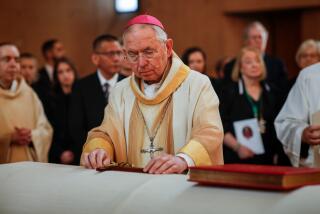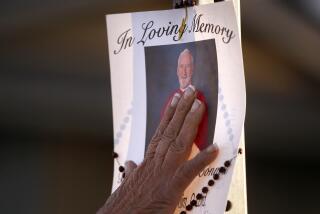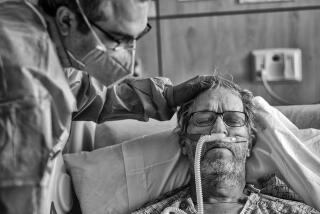Aiding the Ill Is Minister’s Life Calling
- Share via
Paul A. Baglien, 39, learned early in his assignment as a chaplain to trust in more than himself. “I knew it was God,” he said.
It was a broken relationship that helped Baglien better understand his role of ministering to the sick, particularly the terminally ill, at Martin Luther Hospital in Anaheim.
“That breakup was a very painful time of my life,” he said, “but when I realized God was with me, I knew I would survive.”
Now married for 10 years and the father of five children, Baglien said his role in life is to visit patients, many with no hope of surviving.
“This is my calling now, and I could be doing this the rest of my life,” said the graduate of Cal Lutheran University in Thousand Oaks, where he earned degrees in psychology and a master’s degree in education.
Baglien majored in psychology with the idea of helping others through counseling.
He also took classes in religious studies, which no doubt pleased his Lutheran minister father, S. Richard Baglien, of Orange, who works on an interim basis in Orange County churches.
“I wasn’t sure of my career goals, but my mother and dad said I told my Sunday School teacher I wanted to be a minister when I grew up,” he said.
But he points out that “I didn’t want to go into the ministry because my father was in it.”
While attending school, he worked at a number of jobs, including a management training program for Sears, Roebuck & Co., “but I found nothing really satisfied me.”
At age 24, he decided to enroll at Pacific Lutheran Theological Seminary in Berkeley, where his training in clinical pastoral education at a San Francisco hospital directed him to work with people in crisis.
Baglien said he is often asked why he chose to minister to the terminally ill instead of seeking a church ministry. “I tell them this is satisfying to me. A church can be diffused and confused. This is much more focused and specialized, and that helps me keep my sanity,” he explained.
To help him survive the daily trauma, he said, “when I leave the hospital I try to leave the pain and suffering in that room. I give the burden of my work to God.”
But sometimes, he acknowledged, “it is hard to forget and leave the suffering behind. Before and after each day, I stop in the chapel and unburden myself.”
Considering the constantly changing condition of the very ill and the people in the emergency room, “I could easily stay at the hospital 24 hours a day.”
To relax, however, the North Dakota-born chaplain gardens at home and takes camping trips with his children and his wife, Susan, an intensive care nurse at St. Joseph Hospital in Orange.
‘We understand each other’s work and are very supportive of each other,” Baglien said. “We are trying to live a balanced life with our family, although sometimes I think I’m overwhelmed with the family.”
Although he wrongly contends that “I’m not gifted with words,” Baglien believes that it is important to listen and have a few right words when talking to the terminally ill. “I help people listen to themselves.”
Added Baglien:”Any illness, especially a terminal case, is a time for reflection on life and mortality. The thought of death can bring a person in contact with religion.”
More to Read
Sign up for Essential California
The most important California stories and recommendations in your inbox every morning.
You may occasionally receive promotional content from the Los Angeles Times.













